

Why Auditability in AI Systems Matters More Than Ever in 2025






“Trust, but verify” - Ronald Reagan
When applied to AI systems, this saying becomes a necessity. As AI continues to shape decisions that affect people’s lives, companies need something more than “word of mouth” in their models; they need verifiable auditability.
This involves understanding with confidence how an AI model makes decisions, ensuring it behaves as intended, detecting and addressing bias, and validating its alignment with ethical and legal standards.
So how can companies be sure their AI systems are working as intended?
By establishing clear audit criteria, meaning measurable, documented standards for data quality, algorithmic fairness, interpretability, outcome consistency, and compliance.
By applying frameworks that span the AI lifecycle from design and development, through deployment and monitoring, and by using both internal and independent audits.
In this article, we’ll explore what auditability in AI systems truly means, why audits matter, what the core components are, and what best practices can help organisations build trust via verification rather than hoping everything works.
“Auditability in AI systems is the process of tracking, analyzing, and understanding how AI systems function. This includes its decision-making process, the data it uses, and how it shares outputs.”
To facilitate a structured review of AI systems or AI audits from internal or external parties, organizations must maintain logs, documentation, and transparent mechanisms.
Auditability in AI systems is crucial, as it fosters trust by providing visibility. It assists governance teams by detecting unfavorable outcomes, managing system failures, and maintaining compliance with the latest regulations, such as ISO 42001 or the EU AI ACT.
Accountability is impossible to achieve without audit trails. This matters more for sectors like legal, healthcare, and finance, where the stakes are high.
AI ethics embrace a set of principles and guidelines to ensure its responsible use. Auditability, therefore, becomes an essential component of AI ethics as it supports the verification of AI decisions, promoting trust and accountability. It also acts as a testament to a company’s commitment to transparency and ethics.
When it comes to AI, various aspects come into play that require auditing and oversight. Here are the three most prominent ones.
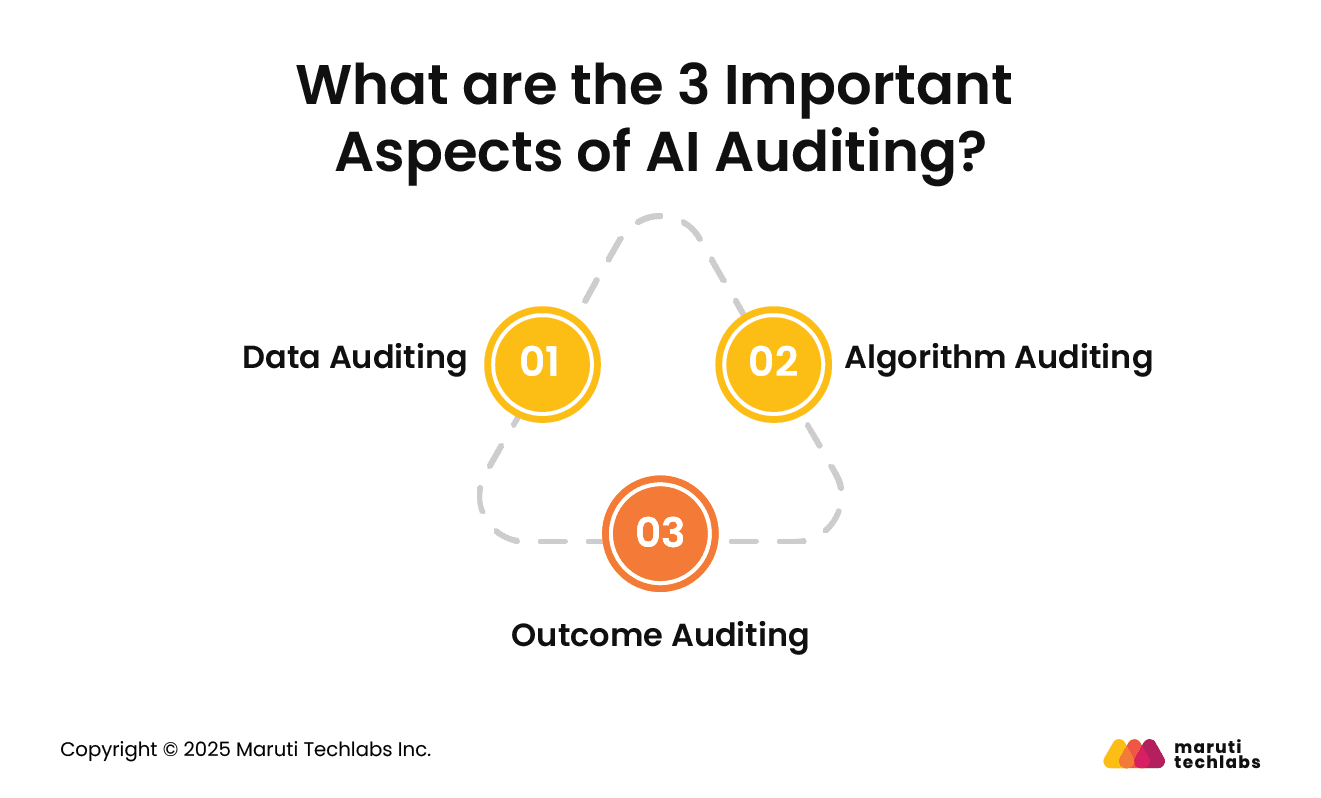
As the name suggests, this aspect audits the data used for training AI systems. Its primary attributes are completeness, accuracy, and bias. It also includes verifying data processing practices, data storage methods, and data collection processes.
Data auditing assures that the data fed into AI systems is reliable and representative of diverse populations. For instance, a customer data audit for an AI-based marketing tool ensures the suggestions it shares aren’t biased. Human auditors also play a vital role in this process, sharing their expertise on data quality and relevance.
Here, the algorithms undergo scrutiny to ensure they function as intended, mitigating bias. This process begins by inspecting the logic, algorithm, and parameters. It benefits an organization by identifying algorithmic bias, unintended consequences, and technical flaws.
For instance, auditing loan approval algorithms can help avoid bias in lending practices. However, this aspect of auditing necessitates a thorough examination of the technical aspects of machine learning models and other AI technologies.
Outcome auditing examines the output shared by AI systems to learn their accuracy, fairness, and consistency. This process involves comparing baseline standards with AI results to learn deviations or anomalies. It verifies if the outputs and intended goals align, eliminating the probability of new biases or errors.
For instance, auditing outcomes of a predictive maintenance system for a manufacturing firm confirms its ability to identify equipment failures. Regular outcome audits are essential for organizations to maintain the reliability and trust in their AI systems.
Imagine an AI system that expresses racial bias while hiring or leaks confidential financial information. So, it’s critical to audit AI systems. An explicit AI auditing framework ensures that AI applications are not only effective but also readily meet legal, ethical, and organizational standards.
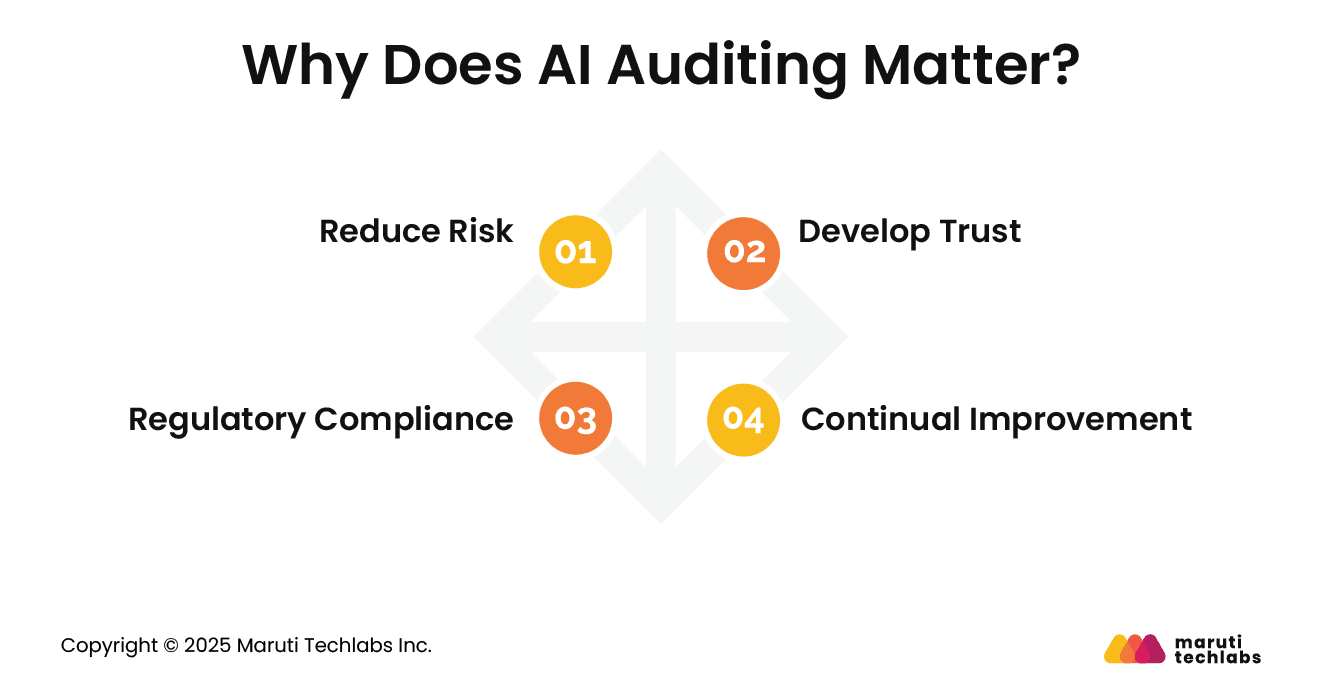
A timely audit of an AI system can:
Introducing auditability in AI systems offers the following advantages.
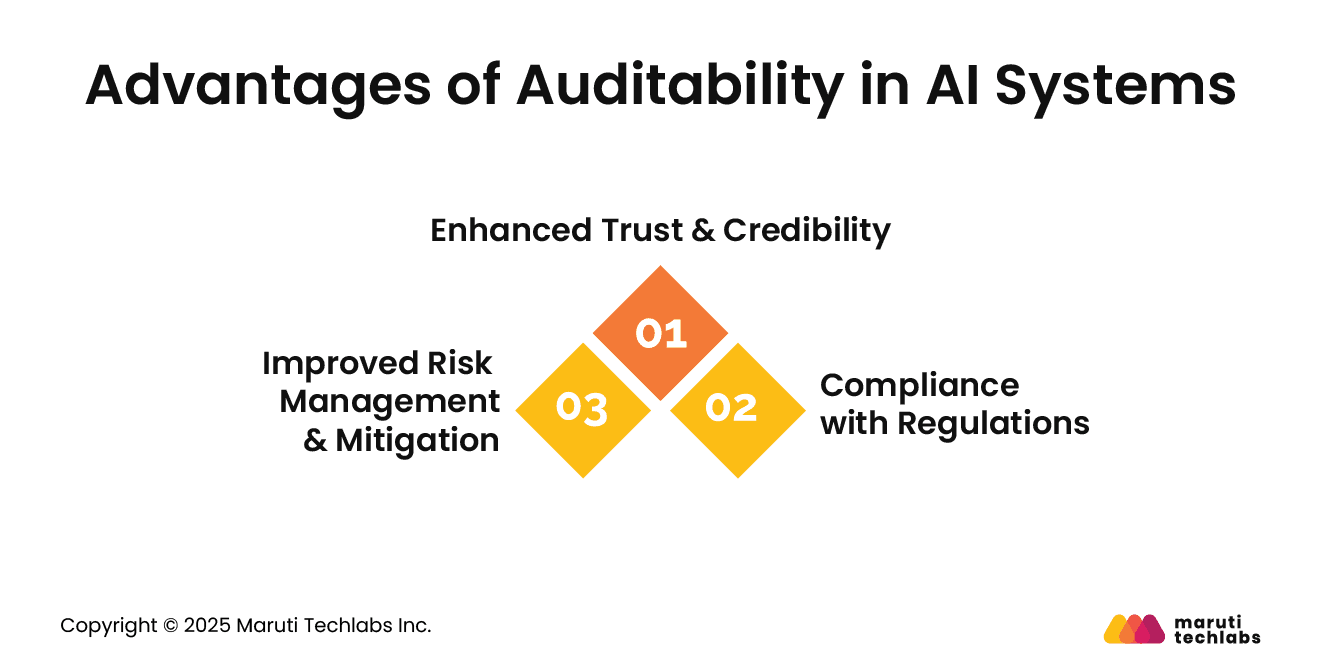
With increased transparency into AI’s decision-making process, auditability increases trust and credibility among stakeholders. Stakeholders are more likely to trust AI outcomes when they have a thorough understanding of its decision-making process.
It enables organizations to comply with regulations such as the General Data Protection Regulation (GDPR) or the Health Insurance Portability and Accountability Act (HIPAA). With complete records of AI audits, organizations can prove their adherence to relevant laws and regulations.
Auditability helps identify biases or anomalies in AI decision-making, allowing organizations to reduce risks associated with AI systems. Organizations can plan corrective actions by tracking and analyzing the decisions made by AI.
A structured audit framework ensures fairness, compliance, and reliability in AI operations. Here are the essential steps that must be followed to deliver an adequate examination and evaluation of your AI system.
Define an audit scope that specifies the areas of your focus and the AI systems you plan to audit. Set clear objectives.
Collect all essential data that includes inputs, algorithm documentation, and outcomes. Clean and structure the data for analysis.
Verify the quality of data fed into the AI system for accuracy, completeness, and bias.
Evaluate the AI algorithm to ensure it operates correctly without errors. Examine the governance structure around their development and maintenance.
Identify anomalies in the output generated by AI when comparing it with the expected results.
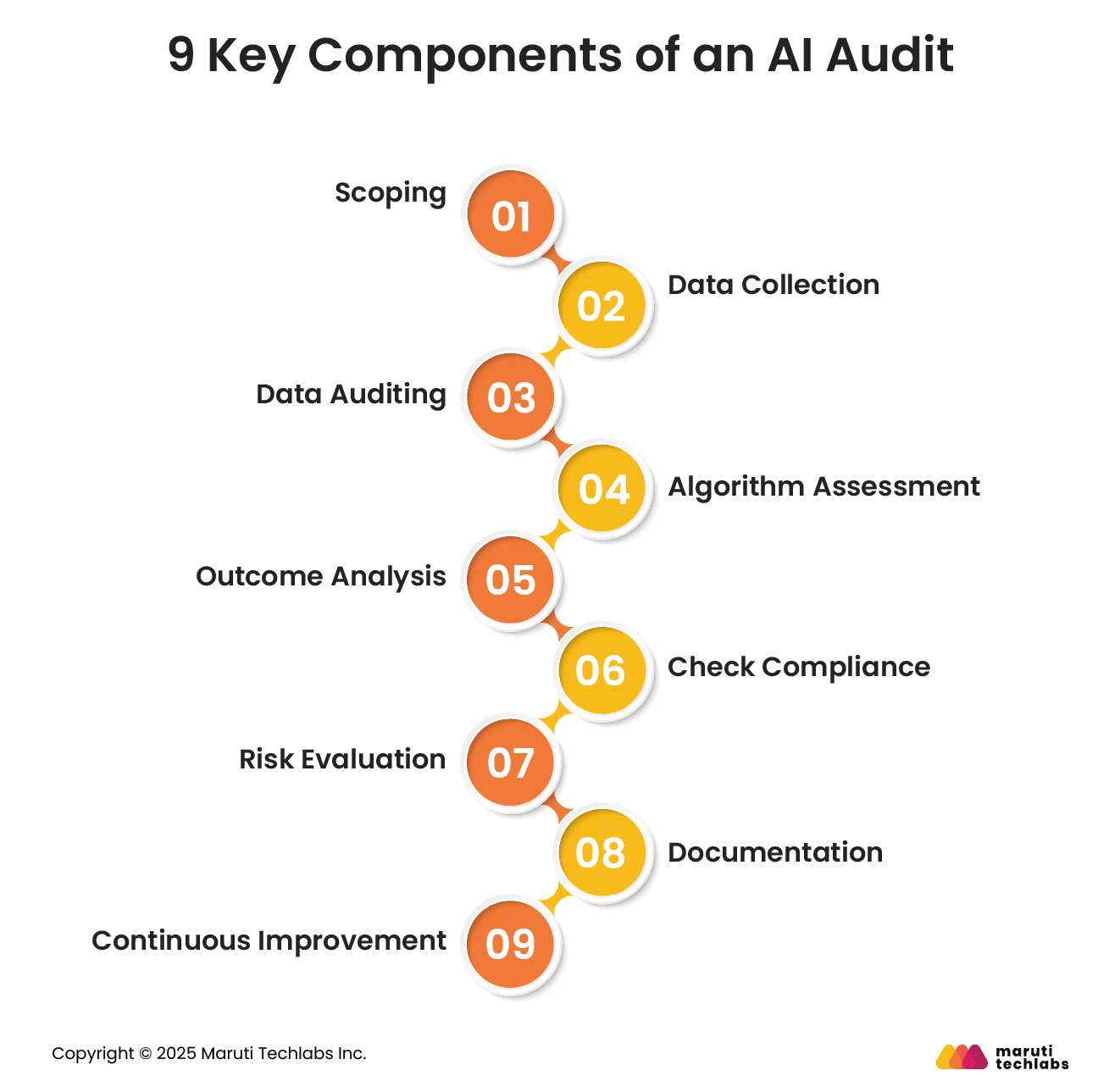
Verify that your AI systems comply with standards such as GDPR or CCPA.
List and examine potential risks concerning outcome accuracy, data quality, and algorithmic bias. Prepare a plan to mitigate these risks.
Create a detailed report to document your audit’s findings. This includes methods and suggestions for improvements.
Implementing the findings from your audits while continuously monitoring your AI system for performance and ongoing compliance. Curate a process that strives for continuous improvement with timely audits.
Introducing auditability in AI systems isn’t a straightforward task. Here are the top challenges that organizations face.
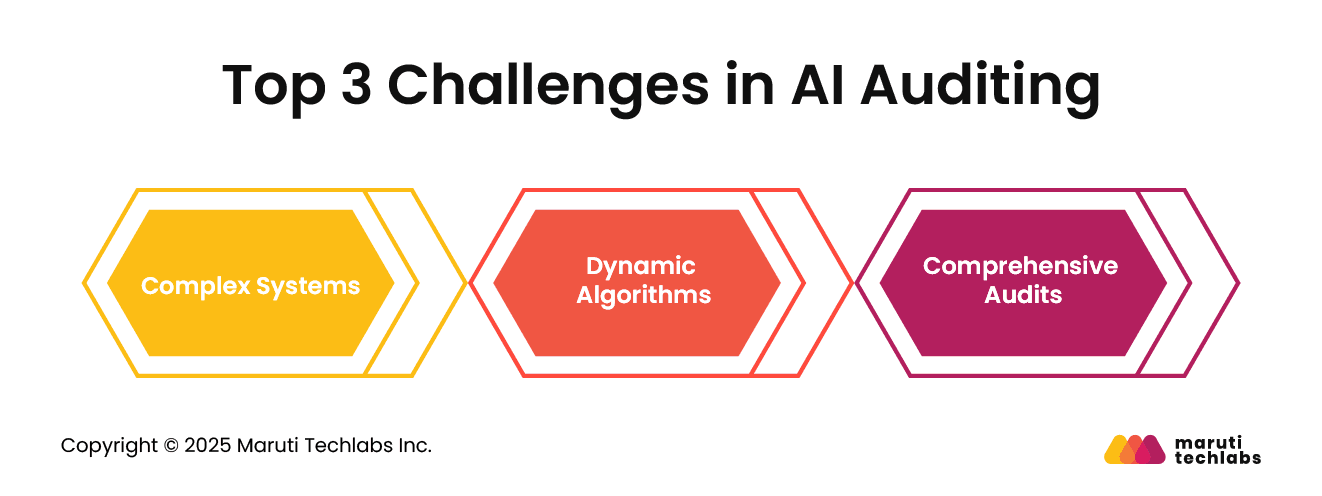
AI systems are developed using various subfields, including machine learning, natural language processing, and computer vision. All come with their own complexities. Auditors require specialized knowledge and expertise to understand them.
Internal audit teams need AI specialists to manage these complexities. Auditors can leverage advanced tools, such as machine learning interpretability tools and automated code analysis, to address these complexities.
Deep learning models use dynamic algorithms that auto-update with new data, causing changes in performance and behavior. This requires switching to real-time monitoring techniques and conducting timely re-evaluations of algorithms.
For instance, real-time monitoring and audits of an AI-based financial trading corporation account for compliance and performance. This allows them to learn changes in the algorithm’s behavior, facilitating early interventions or adjustments.
AI systems comprise multiple domains. Therefore, it’s necessary to audit all aspects like algorithm processing, data inputs, and generated outputs. Implement thorough audits by focusing on critical components and high-risk areas.
For instance, auditing critical algorithms of an autonomous vehicle platform can enhance safety and reliability. From development to implementation to ongoing maintenance, auditors should consider the entire lifecycle of AI systems. This provides a comprehensive view for auditors, identifying potential issues and risks, and ensuring adherence to regulatory requirements.
Before diving into your audit, it’s important to set the right groundwork. Let’s observe the 3 best practices that you can follow before commencing your AI audit.
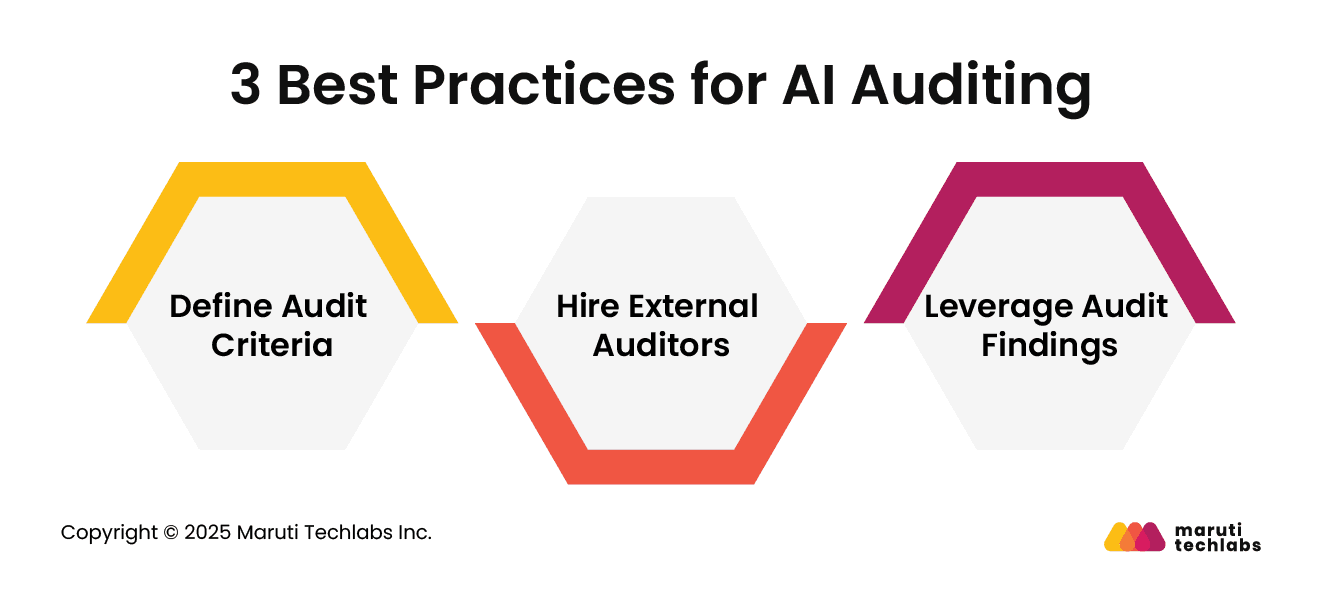
AI audits must begin by setting clear and measurable criteria. This means defining data quality, algorithm performance, and expected outcomes. For instance, an AI-powered recruitment system with established criteria for accuracy, fairness, and transparency is crucial for conducting thorough audits.
Independent or external auditors can offer an unbiased opinion when auditing AI systems. They view audits more objectively, offering their expertise that culminates in a thorough audit. These insights are crucial to creating a comprehensive governance structure for AI projects.
Organizations that are yet to invest in AI can also perform an AI readiness audit to help you understand the cost, efforts, and resources you will need to bring your idea to fruition.
Use the audit findings to upgrade and improve your AI systems. This involves understanding current limitations and issues, and implementing fixes that enhance performance and credibility.
As AI continues to shape decisions in finance, healthcare, governance, and beyond, the importance of robust auditing cannot be overstated. Without clear audit trails, organizations risk decision-making, regulatory penalties, and erosion of public trust.
Establishing transparent, explainable, and consistent audit criteria ensures accountability, fairness, and compliance, while safeguarding the business's reputation.
Looking ahead, AI auditing will evolve beyond compliance checklists to include real-time monitoring, continuous bias detection, and alignment with global ethical frameworks.
At Maruti Techlabs, we specialize in building AI solutions that are not only powerful but also auditable, ethical, and enterprise-ready.
Whether you’re implementing new AI systems or evaluating existing ones, our AI consulting services can help you design transparent, trustworthy AI that meets regulatory and business needs.
Connect with us today to build responsible AI that delivers supreme value for your business needs.
Not sure where your organization stands today? Use our AI Readiness Calculator to assess your current maturity and take the right steps toward building responsible, auditable AI systems.


